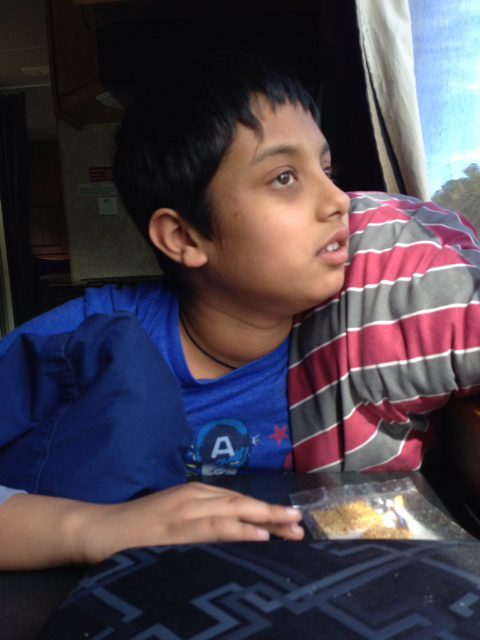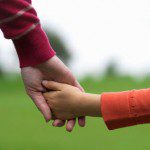 It’s the milestones that have tripped me up over the years, causing me to focus on what wasn’t happening in the time it should happen, instead of the little, incremental steps forward (and backward, and then forward again) that were unfolding in front of my eyes. Milestones are a tricky thing.
It’s the milestones that have tripped me up over the years, causing me to focus on what wasn’t happening in the time it should happen, instead of the little, incremental steps forward (and backward, and then forward again) that were unfolding in front of my eyes. Milestones are a tricky thing.
Pediatricians tell you when a child should roll over, sit up, crawl, walk, start to babble, say Mama and Dada, imitate your sounds and point to something. When they should start to say little sentences and be able to spoon some applesauce into their messy mouths. Or later on, educators tell you about when a child should start to read, by when he should be exhibiting the proper pencil grip, when he should be able to dress himself or be able to fall asleep without you having to sit with him.
Parents inevitable and casually compare notes about when little Johnny did this or what sweet Sara is doing now. We compare, learn from each other, get a little concerned when it seems our kids are not picking up these milestones fast enough or feel a little proud when we see our kiddos are ahead of the curve.
Lil D’s first evaluation was done when he was approaching his third birthday, after a year of early intervention and just before his official diagnosis of PDD-NOS (otherwise known as autism). It confirmed for me what I already knew – that this child was not about typical milestones.
No. Because at that tender age, he was already deemed to be functioning at the level of a six-month-old in many areas, from cognition to communication to fine motor and gross motor skills.
That memory will never leave me – sitting in our one-bedroom apartment in New York, heavily pregnant with Amal, reading through Lil D’s evaluation with tears silently flowing as I contemplated two questions:
Ya Allah, why?
Ya Allah, what now?
It is ten years later, and we had another evaluation done a few weeks back, with Lil D now at the ripe, robust age of 13. As I sat in the doctor’s office with him, my husband and the observing doctor, we went through his history. I answered all her questions about what he could and couldn’t do. I filled out the testing evaluation forms, realizing how many times on the scales he was near a 0. The doctor said to me, “You do quite a lot for him.”
Well yes, I guess I do. I don’t analyze on a daily basis how much I (and our whole family and team of teachers and therapists) assist and support Lil D throughout every minute of his day. Or how much my other children innately do that he does not or cannot. But when I stop to explain to my sister-in-law how to support him through dinner and help him get ready for bed, or write a 20-page dossier for my mom about caring for Lil D when I go out of town, then it hits me.
So much support. So many missed milestones.
But you know what? These milestones that doctors, parents and teachers discuss amongst themselves, these milestones written in baby handbooks and child-rearing websites – they don’t fit us. They never have and they never will. Because they don’t take into account all the hard work and practice and teaching that happened before when Lil D first started saying “No” (and not just saying it, but that he meant to say it) to us when we asked him a very specific question (age 13).
Or when I called for him to come downstairs when he was on a different level of our house, and he actually understood what I was asking and came down instead of tuning me out (age 7).
Or when he held the hand of a girl and walked around the track with her, giggling all the while, at a weekly activity that pairs high school kids with autistic kids to do athletic activities (age 13).
Or when, after months of snippets of practicing with his Dadima (paternal grandmother), she got him to recite in fits and starts and approximations, some lines from the Quran and then proudly announced to us that Lil D had had his “Bismillah” (age 4).
Or the first time he rode the bus to and from school without crying the whole way after having cried for a solid month (age 3).
Or the first time he came home from school after hitting himself so hard and for so long that the side of his face was swollen and discolored, and he immediately went to his room, got under the covers and stayed there until it was time to go back to school the next morning (age 11).
Or, the first time he was caught between another older boy with autism, who became upset, and the bus aide, who the boy was trying to strike. But the boy ended up hitting Lil D instead because he was strapped into his seat and couldn’t move away (age 12).
Or the first time, in the middle of a great home therapy session, that he turned 180 degrees and got so angry at having to sort his clothes into the correct bins that he banged his forehead into the wall. Banged it so hard that downstairs I heard the loudest thud and felt the ceiling shake, and when I ran up to check, I saw him lying in rage on the floor and the wall dented and cracked by the shape of his forehead (age 13, last night).
These are our milestones, the good ones and the bad ones. The ones I wish never would’ve happened and make me fearful for what other bad milestones may be in his future. And the ones that I never would’ve appreciated as much as I have if I had been focused on what “the experts” were saying.
These are our milestones.












